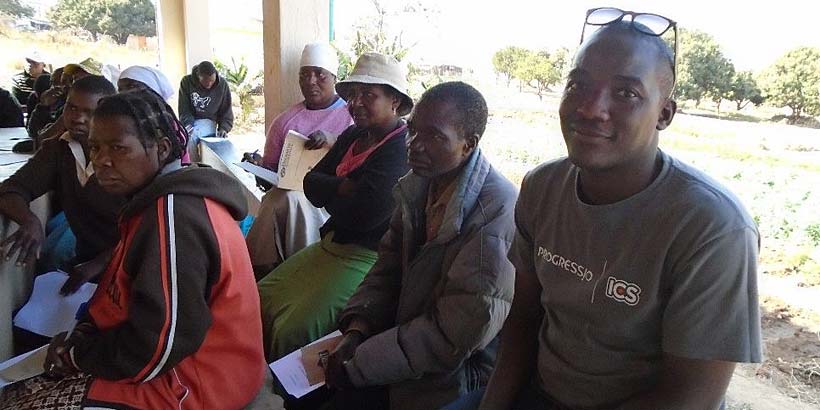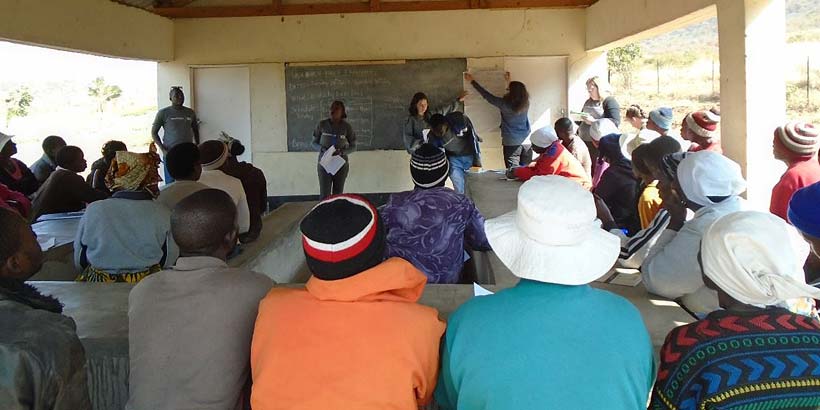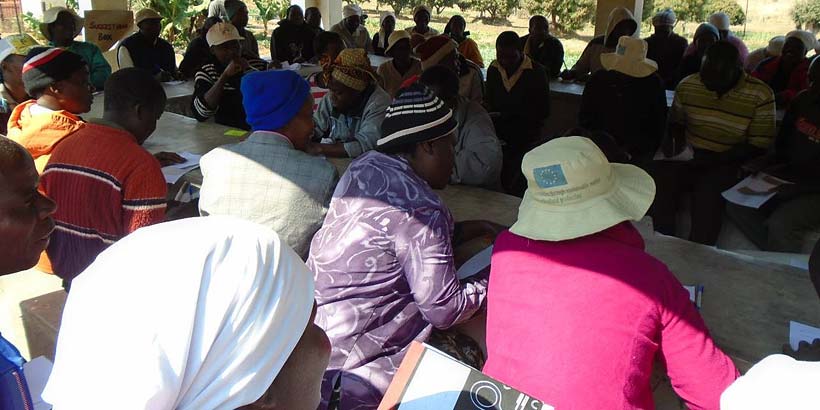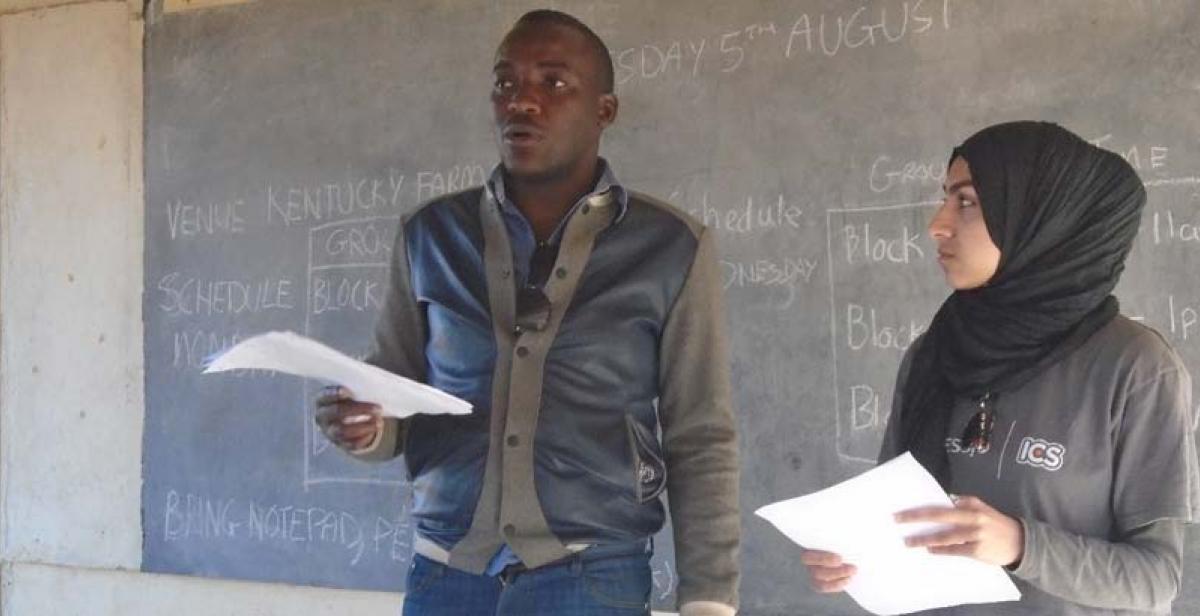Seven weeks ago I had zero clue on what ‘ISALS’ could have possibly meant. Now, after having completed five training sessions with an average of 80 farmers per session, I’d like to think I have acquired enough information on the subject to confidently say, “Why yes, I do know what an ISAL is!”
Let me take you back to our first week of placement… my entire team and I were given a three day orientation by our partner organisation, Caritas, on the areas of development we would be focusing on whilst out here in Mutare. These being marketing and market linkage and ISALS. This is when we learnt that the abbreviation, ISALS , literally means Internal Savings and Lending Schemes.
The idea of an Internal Savings and Lending Scheme is a small group of people having a mutual agreement to contribute a certain amount of money regularly into a group fund, with the hopes of seeing the fund grow. Members within the group can request to take out a loan to invest into some sort of income generating activity (IGA). For example, bulk buying and selling, or collecting firewood. S/he is then required to pay back the loan at an agreed time, with a low interest rate. This allows the members to not only develop and strengthen their entrepreneurial skills, but also serves as a way to pay for any difficult situations they may face, with additional money to pay back the loan and interest.

An ISAL is heavily beneficial as a development scheme; ensuring those involved have absolute control over each aspect of their ISAL group, as they are the individuals responsible for creating and deciding upon their constitution. An ISAL also works as a safe, affordable and trustworthy means of watching your income multiply. This is particularly useful for people who are struggling due to a low amount of income, and may be lacking in the documentation necessary to access a loan from a bank. The only real requirement needed for an ISAL to be successful is the participation of members within the group!
On learning this, we produced baseline questionnaires and surveys to conduct in order to gain a better understanding of the people we would be aiming to help, and their current conditions in terms of income. These people are known as the ‘beneficiaries’, essentially farmers from four different communities in and around the city who all own and run their own allotments and gardens at Kentucky Farm. From the surveys we carried out, we learned 71 per cent of the farmers are female, and 29 per cent male. Actually meeting and speaking to these beneficiaries was incredibly helpful for us as a team- not only did it provide us with the necessary information we needed to then proceed with planning for sessions, but it gave us a chance to introduce ourselves and see each farmer with his/ her plot.
Finishing the introductory and initial work meant we could move on to the planning of the sessions. We broke down the topics within ISALS into five pillars, using the Concern Worldwide Village Savings & Lending Community Based Trainers Guide. The Five Pillars of ISALS consist of: Individual Self-Screening, Groups and Leadership, Constitution, Group Fund Development and Records. We based each session plan on a single pillar, resulting in the beneficiaries attending 5 sessions each to complete their ISALS training.

Whilst planning these sessions it was imperative for both UK and national volunteers to work together to create sessions which could be delivered in both English and Shona. This is due to many beneficiaries either not understanding English, or preferring to be taught in Shona. As the weeks passed we devised an efficient way of forming and teaching the sessions as a group, giving each member the opportunity to plan, present and have equal amounts of input. This showcased each team member’s best qualities, which naturally caused us all to give one another ISAL-related nicknames, for example, M&E Queen Laura (M&E meaning monitoring and evaluating) Noku the Translator Guru.
In the early planning stages before performing any sessions, we decided it was essential for us to have a feedback and plenary section for each session, meaning we could monitor our progress and the short-term impacts we may be making. We used both informal and formal feedback, in the form of verbally asking beneficiaries how they felt about the sessions and what they had learnt, and also using slightly longer, more detailed formal feedback questionnaires, which we conducted with a 10 per cent sample of attendees. The large majority of feedback has been very positive, and clearly demonstrates the knowledge gained by the beneficiaries post ISAL training sessions.
As the sessions were content heavy, we put in place some fun, interactive activities to keep the beneficiaries engaged. This included ice-breakers and energisers involving traditional Zimbabwean songs and d ances, a group favourite being the song we now know as ‘Ndiyani aronga so!’, translating as ‘Who planned this?’. The first time we sang this will forever be a memorable moment for the entire ISALS team. We drove away from Kentucky farm singing this song and cheering all the way to Mid-term Review, where we greeted the other Progressio ICS volunteers. They heard us before they saw us!

Another popular feature within the training sessions was the use of role-plays and group discussions, which revealed just how many beneficiaries are keeping their acting skills hidden. We, as a group, were so impressed with the participation from the farmers, and had such a wonderful time learning from them about their culture.
Now that all the planned sessions have taken place, we have compiled booklets and information packs in both English and Shona, which summarise all the points covered, and can be used as reference points for the beneficiaries. We are also helping several beneficiaries set up their ISAL groups and draft their constitutions, should they need help with doing so. Alongside this, we have designed and printed certificates for beneficiaries on completing their training course and hope to award them with these very soon at an upcoming community event.
This entire process has been hugely enlightening and rewarding for us as a group of volunteers and we are all going away with a great understanding and appreciation for ISALS, and how beneficial they can be.
For now, all the love.
Written by ICS volunteer Thalaya Darr



